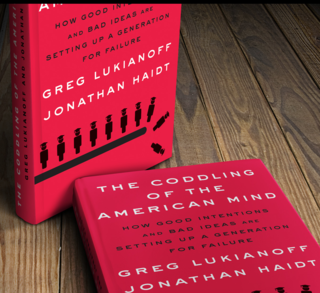Bullying
Antibullyism and "The Coddling of the American Mind" Part 1
Book by Haidt and Lukianoff reveals the problems with anti-bullying movement
Posted January 24, 2019

A couple of years ago I was delighted to learn that two of my heroes, Greg Lukianoff and Jonathan Haidt, were collaborating on a full-length book based on their wildly popular article in The Atlantic, The Coddling of the American Mind. I was confident that their forthcoming book would provide a wealth of information on the problems with antibullyism and thereby add ammunition to my lonely and thankless mission of countering this destructive social movement. The book finally saw print a few months ago, and my expectations (except for one) were not disappointed. If you care about the wellbeing of our children and society you must read it.
About the term antibullyism
Are you wondering why you aren’t familiar with the term antibullyism? It’s because the only place you could have encountered it is in my articles. I coined it as a more accurate and concise label for the anti-bullying movement, just as environmentalism is for the save-the-environment movement. Antibullyism is an ideology with a fundamental set of beliefs and a mission of making the world a better place. As such, it deserves an “ism” label. I hope it catches on.
The authors
Greg Lukianoff is the president and CEO of the Foundation for Individual Rights in Education (FIRE), the major force fighting for Freedom of Speech on American campuses. I share his passion for this freedom, as I have been arguing (and demonstrating) for two decades that it is the solution to most bullying. I also wrote reviews of his 2012 book, Unlearning Liberty: Campus Censorship and the End of American Debate, and the 2014 paperback edition.
Professor Jonathan Haidt, a social psychologist specializing in ethics, is author of the brilliant books, The Happiness Hypothesis: Finding Modern Truth in Ancient Wisdom, and The Righteous Mind: Why Good People are Divided by Politics and Religion. I love him because he is a true peacemaker, using good scientific psychology and philosophical thinking to help people of opposing political and religious views understand and appreciate one another. And I admire him because of his courage. His Heterodox Academy (I recommend you subscribe) has been spearheading the pushback against the far-left political domination of our universities, particularly of the social sciences. This political domination has made the sciences less scientific and curtailed Freedom of Speech, thereby constraining development of the open-minded, rational thinking that is supposed to be the hallmark of higher education. It is the same mission that Prof. Jordan Peterson (another of my heroes) is championing with similar courage, but because of Haidt’s highly personable manner and mellifluous voice, he provokes less resistance than Peterson. And like myself, Haidt has been combatting the victim mentality. For a beautiful example, watch the following short lecture, The Rise of VICTIMHOOD Culture on Campus.
The paucity of literature criticizing antibullyism
Antibullyism, unofficially launched in response to the Columbine massacre of 1999, has become the most popular social movement in history. Though it has been failing dismally, criticism of antibullyism is almost non-existent. Since its inception, I have been fighting almost single-handedly to raise awareness of the folly of the war against bullying. I have therefore been excited whenever any other psychological professionals contribute their own critiques. The first such contribution was a chapter called The Bully Bandwagon in the 2009 book, Reclaiming Childhood: Freedom and Play in an Age of Fear, by Prof. Helene Guldberg. The only other contribution was the 2013 book, Bully Nation: Why America's Approach to Childhood Aggression is Bad for Everyone, by psychologist Susan Eva Porter, entirely dedicated to challenging antibullyism.
Now, I am excited to add The Coddling of the American Mind to the list (for brevity, to be referred to hereon as “The Coddling.”) The subtitle is superb: How Good Intentions and Bad Ideas are Setting Up a Generation for Failure. The “good intentions” is borrowed, of course, from the brilliant maxim: The road to hell is paved with good intentions. Almost a decade ago, I began posting my Ten Principles for Moral Discipline in this Psychology Today venue. Coincidentally, the first of my principles is none other than The Road to Hell is Paved with Good Intentions. Indeed, antibullyism has the best of intentions. Unfortunately, as Haidt and Lukianoff inform us, good intentions are no guarantee of good outcomes. Their book presents a detailed and accurate analysis of the historical processes that have given rise to antibullyism; how its bad ideas are harming the intellectual, emotional and social development of our young people, while fostering intolerance and even physical violence.
The Coddling’s omission of antibullyism
To be honest, The Coddling does not ostensibly engage in criticism of antibullyism, and only mentions the word bullying three times. Perhaps Haidt and Lukianoff would even resent my use of their book to promote my own agenda.
Nevertheless, I was puzzled by their omission of antibullyism, as it has been the foremost delivery system of the “bad ideas that have been setting up a generation for failure.” Yearly month-long bullying awareness campaigns have succeeded in making bullying the number one fear of parents and spawned a multi-billion-dollar industry to combat it. Antibullyism has been mandated by law in every state and thus embedded in school policy from K-12, and is a common focus of news and entertainment media. Furthermore, the current generation of college students –the primary focus of The Coddling – is the first generation to have had anti-bullying indoctrination throughout their entire schooling.
On hindsight it is to be expected that the book overlooked antibullyism. The Coddling is mostly a criticism of political correctness, and such criticism has been mainstream for decades. However, virtually no one recognizes that antibullyism is the quintessential embodiment of political correctness, bestowing potential victim status on everyone. The idea of protecting children from evil bullies sounds obviously virtuous. Why would anyone suspect that there could be anything amiss in a movement buttressed by thousands of research studies and promoted by all major psychological and educational organizations? Haidt and Lukianoff are not to be faulted for failing to seriously investigate an apparent non-issue. Countering antibullyism has been my self-imposed mission, not theirs.
Haidt confirmed my suspicion about the reason for the neglect during his guest appearance on The Joe Rogan Experience. While he acknowledges that the meaning of bullying has become overly broad, he accepts academic psychology’s depiction of bullying as a particularly vicious behavior traditionally associated with the crime of assault and battery, something to which kids cannot be expected to be resilient, and therefore falling outside the realm of the child overprotective processes that The Coddling investigates. Haidt apparently hasn’t been made aware that antibullyism, with its well-intentioned goal of protecting children from bullying in the traditional sense of assault and battery, actually goes way beyond that; that it is a war against all negative behavior; that it is most particularly a war against freedom of speech, the right that he and Lukianoff have been so valiantly championing.
Therefore I am taking it upon myself to fill the gap in The Coddling. I will be showing how antibullyism epitomizes all the “bad ideas” the book identifies.




